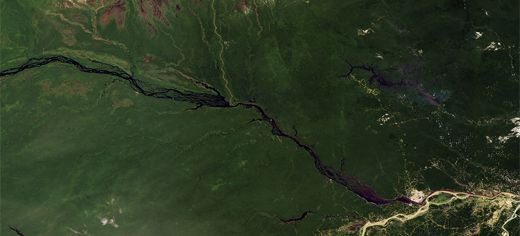
For the first time, astronomers and global change researchers are collaborating to measure changes at a global scale on our own planet, beginning with tropical forests.
"The ASTROTROP project will help global change scientists to start observing changes on planet Earth with the same rigour as astronomers observe stars," said Dr Alan Grainger from the School of Geography at the University of Leeds, who co-leads the project.
In the project, a network of UK tropical forest researchers, coordinated by the University of Leeds, will collaborate with a network of European astronomers, coordinated by the Royal Observatory Edinburgh. ASTROTROP will be launched in Edinburgh on 30-31 October at the Measuring the Planet 2013 conference.
Although Earth observation satellites have collected global data for over 40 years, there is still no mechanism to convert these data into accurate global information on key aspects of planetary change, such as how quickly tropical forest areas are changing. Scientists need this information to produce reliable estimates of the resulting rates of carbon emissions and species loss.
The ASTROTROP project is intended to pave the way for a Pan-Tropical Forest Observatory that can fill this gap. It tackles the two main constraints on planetary measurement: lack of collaboration between different scientific disciplines, and technological difficulties that arise when handling 'big data'.
"The key remaining technological challenge that we need to overcome to make a Pan-Tropical Forest Observatory operational is to combine numerous spatial databases on changes in forest area, carbon and species content in different regions," said Dr Grainger. "Our first thought was to combine them in just one big computer database, from which scientists could download the digital maps they needed. Then we learned that astronomers had successfully tackled a similar problem in a different way."
Astronomers needed to combine multiple digital maps showing the visible, infrared, X-ray and other features of the Universe. To meet this challenge, the Science and Technology Facilities Council (STFC) funded the development of AstroGrid virtual observatory software between 2001 and 2009. This software enables astronomers to combine multiple digital maps from different locations across the world using the web. The data is standardised so that astronomers can use a ‘mix and match’ approach from various datasets.
STFC is now funding ASTROTROP project to test the feasibility of using AstroGrid software to monitor changes in the world's tropical forests. Running the software on a powerful central computer would allow data on forest areas collected by satellites, and processed by teams of scientists across the world, to be combined with data on the distribution of species and carbon within forests, measured by hundreds of other researchers.
"It's very satisfying to be able to share experiences from very different areas," said Professor Andy Lawrence from the University of Edinburgh, who coordinates the astronomy side of the project. "The similarities are closer than we thought. For example, the number of stars in the Milky Way is very similar to the number of trees in tropical forests on Earth."
Dr Grainger concludes: “The astronomers and tropical forest researchers participating in the project are excited about how much they can learn from each other, and we are inviting other scientists to join us. The STFC's Challenge Led Applied Systems Programme (CLASP) also enables us to involve corporate partners, so that UK plc can gain a world lead in global environmental observatory technology."
Image credit: ESA
Further information
Dr Alan Grainger is available for interview. Please contact the press office at the University of Leeds on 0113 343 4031 or email pressoffice@leeds.ac.uk
Professor Andy Lawrence is available for interview. Please contact Catriona Kelly, Press Officer, University of Edinburgh, on 0131 651 4401 or email catriona.kelly@ed.ac.uk